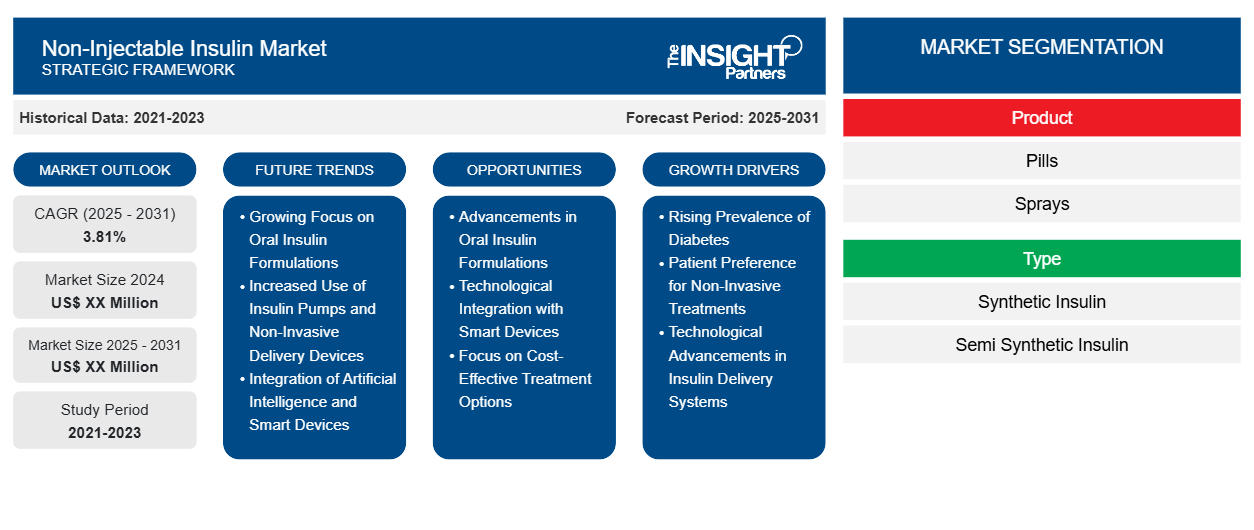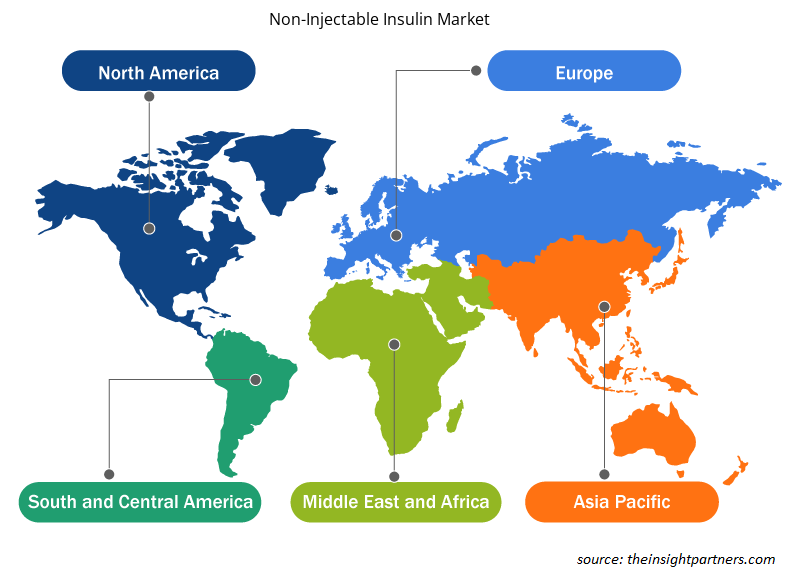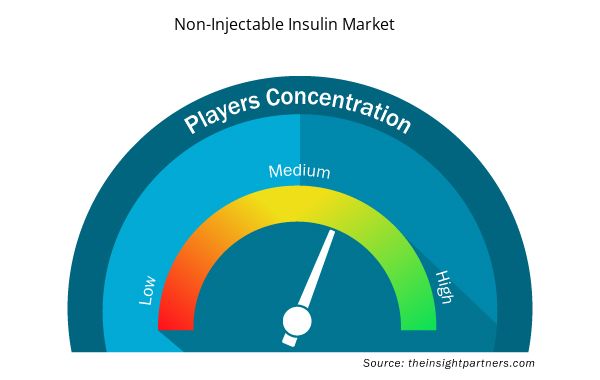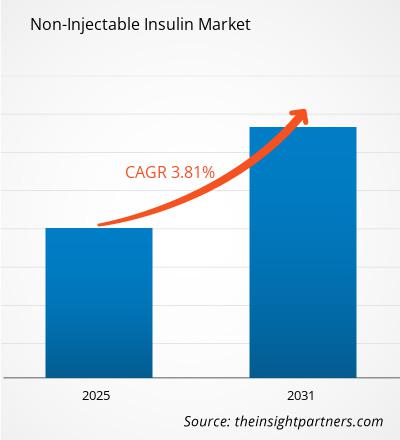The Non-Injectable Insulin Market is expected to register a CAGR of 3.81% from 2025 to 2031, with a market size expanding from US$ XX Million in 2024 to US$ XX Million by 2031.
The research report on the Non-Injectable Insulin Market is segmented by type into oral insulin tablets, insulin sprays, and other non-injectable formulations. Applications analyzed include type 1 and type 2 diabetes management, insulin resistance therapy, and pre-diabetes treatment. End-users include pharmaceutical companies, diabetes clinics, hospitals, and healthcare providers. The regional analysis covers key markets such as North America, Europe, Asia Pacific, the Middle East and Africa, and South America. The market evaluation is presented in US$ for all segmental analyses. This report examines the potential for non-injectable insulin formulations as alternatives to traditional insulin injections, particularly in improving patient compliance and ease of use.
Purpose of the Report
The report Non-Injectable Insulin Market by The Insight Partners aims to describe the present landscape and future growth, top driving factors, challenges, and opportunities. This will provide insights to various business stakeholders, such as:
- Technology Providers/Manufacturers: To understand the evolving market dynamics and know the potential growth opportunities, enabling them to make informed strategic decisions.
- Investors: To conduct a comprehensive trend analysis regarding the market growth rate, market financial projections, and opportunities that exist across the value chain.
- Regulatory bodies: To regulate policies and police activities in the market with the aim of minimizing abuse, preserving investor trust and confidence, and upholding the integrity and stability of the market.
Non-Injectable Insulin Market Segmentation
Product
- Pills
- Sprays
Type
- Synthetic Insulin
- Semi Synthetic Insulin
Distribution Channel
- Hospital Pharmacies
- Online Pharmacies
- Drug Stores
You will get customization on any report - free of charge - including parts of this report, or country-level analysis, Excel Data pack, as well as avail great offers and discounts for start-ups & universities
Non-Injectable Insulin Market: Strategic Insights

- Get Top Key Market Trends of this report.This FREE sample will include data analysis, ranging from market trends to estimates and forecasts.
Non-Injectable Insulin Market Growth Drivers
- Rising Prevalence of Diabetes: The increasing prevalence of diabetes, particularly type 2 diabetes, is one of the primary growth drivers for the non-injectable insulin market. The World Health Organization (WHO) reports that about 422 million people worldwide have diabetes while projections indicate this figure will increase substantially because of unhealthy diets combined with inactive lifestyles and an aging population. Insulin therapy demand grows with rising diabetes incidence which usually requires injection-based administration. Patients who want easier management methods for their condition are driving an increase in demand for non-injectable insulin options. People who struggle with needles or who do not wish to administer insulin injections every day now have the option to use non-injectable insulin products including oral forms, nasal applications, and inhalable solutions. Greater awareness about diabetes and its management needs have caused more people to use insulin therapies including those that do not involve injections. The diagnosis of more diabetes patients will result in higher demand for user-friendly insulin delivery systems which will boost the market for non-injectable insulin products.
- Patient Preference for Non-Invasive Treatments: The demand for non-injectable insulin products expands because patients show strong preference for non-invasive treatment options. Many diabetic patients develop phobias about needles or feel discomfort when they need to self-administer insulin injections. Patient treatment adherence suffers when they experience discomfort during therapy. Oral and inhalable insulin represent non-injectable alternatives that patients find more convenient to use and less painful than injections. Oral insulin formulations stand out because they enable diabetic patients to administer treatment via conventional pill formats which they find familiar and comfortable. Inhalable insulin offers quick lung absorption while removing the necessity for injections which enhances patient comfort along with treatment convenience. The market for non-injectable insulin products will keep growing because patients now prefer non-invasive methods to manage diabetes rather than traditional injections. The demand for patient insulin products will likely increase as new non-injectable options emerge with efficacy equal to or better than traditional injections.
- Technological Advancements in Insulin Delivery Systems: The non-injectable insulin market is growing because technological improvements in insulin delivery systems are playing a significant role. Recent years have seen considerable innovation in inhalable insulin which now includes devices developed to enhance user-friendliness while boosting efficiency and comfort. Biotechnological progress has produced insulin formulations that lung absorption can accommodate effectively which makes inhalable insulin a viable substitute for conventional injection methods. Researchers continue to develop oral insulin formulations that can avoid the digestive system and get into the bloodstream directly. Developments in insulin delivery systems have improved non-injectable insulin bioavailability to match the effectiveness of injections. Advancements in insulin formulations combined with the development of simpler delivery devices will propel market expansion because these innovations make non-injectable insulin treatments more practical and accessible to users. Technological advancements will make non-injectable insulin options more popular which will result in substantial market growth.
Non-Injectable Insulin Market Future Trends
- Growing Focus on Oral Insulin Formulations: Future trends in the non-injectable insulin market include the increasing development of oral insulin formulations. While non-injectable insulin options including inhalable versions exist today people still desire the convenience of oral medications because they know how to use them. The administration of insulin as oral medication holds the status of a "holy grail" in diabetes management because patients find it easy to use and readily accept. Despite current difficulties with insulin passing through the digestive system and entering the bloodstream efficiently recent drug delivery technology improvements advance oral insulin as a viable treatment option. Pharmaceutical companies dedicate major resources to develop oral insulin products that will grow in accessibility during future years. Oral insulin stands to transform diabetes treatments by providing patients with a less invasive and more convenient management option if it proves successful. Market expansion seems probable as oral insulin formulations become accepted by both patients and healthcare providers.
- Increased Use of Insulin Pumps and Non-Invasive Delivery Devices: The non-injectable insulin market will evolve as more patients and healthcare providers adopt insulin pumps and non-invasive delivery devices. Insulin pumps are usually used with injectable insulin but pairing them with non-injectable insulin therapies offers patients improved treatment efficiency and convenience. New insulin pump designs incorporate both inhalable and oral insulin delivery systems which expand treatment possibilities and allow patients to customize their diabetes management strategies. New progress in continuous glucose monitoring (CGM) technology enables patients to fine-tune their insulin consumption which allows them to better control their blood sugar levels as it happens. Use of insulin pumps together with CGMs and non-injectable insulin options will likely result in diabetes management systems that are more precise and automated while being more patient-friendly. The ongoing development of technology will make insulin pumps and non-invasive delivery systems more available and efficient which will propel market expansion.
- Integration of Artificial Intelligence and Smart Devices: Artificial intelligence (AI) together with smart devices are becoming integrated into insulin delivery systems which will create important changes within the non-injectable insulin sector. Patients can achieve better insulin optimization through AI systems that process input from continuous glucose monitors and wearable technology alongside additional data sources. These medical devices enable patients to manage their blood sugar by delivering real-time insulin dosage adjustments automatically with little need for manual input. When AI technology merges with non-injectable insulin treatments patients gain access to customized treatment plans based on analyzed data which improves their diabetes management. Tech-savvy patients find this trend attractive because it offers innovative solutions that make diabetes management simpler. The integration of AI and smart devices into insulin delivery systems will likely become essential for the expansion of the non-injectable insulin market.
Non-Injectable Insulin Market Opportunities
- Advancements in Oral Insulin Formulations: Future growth in the non-injectable insulin market depends on ongoing research and development of oral insulin formulations. Diabetes management has long pursued oral insulin because it provides a convenient substitute for patients compared to traditional injection methods. Advancements in drug delivery systems have enhanced both the bioavailability and effectiveness of oral insulin which now stands as a stronger treatment possibility. The development of oral insulin products by pharmaceutical companies that protect against digestive system barriers and deliver insulin into the bloodstream is set to expand the oral insulin market. The progression of these technological advancements may lead to oral insulin becoming a broadly accepted treatment option which will draw both new patients and healthcare providers who value ease and compliance. Non-injectable insulin products would attract more patients because insulin pills simplify diabetes management for those opposed to injections. Manufacturers who develop leading oral insulin products could find themselves in a market with great potential while revolutionizing diabetes treatment.
- Technological Integration with Smart Devices: The combination of non-injectable insulin with smart devices and continuous glucose monitors (CGMs) opens up valuable market opportunities. Many patients currently use smart devices to track their blood glucose levels in real-time thanks to digital health technology advancements. When patients use smart devices alongside non-injectable insulin products like inhalable or oral insulin it allows them to take part in personalized data-driven treatments. Smart devices that use continuous glucose monitoring data to adjust insulin dosages lead to better diabetes management and higher patient compliance. When non-injectable insulin gets integrated with smart technology it simplifies treatment procedures which helps patients maintain their blood sugar at ideal levels. More tech-savvy consumers who prioritize health are driving this opportunity since patients increasingly want easy-to-use diabetes management systems. Manufacturers who invest in interconnected smart insulin delivery systems can grow their market share by serving technology-oriented patients. Improvements in artificial intelligence and data analytics will likely result in better treatment outcomes and higher patient adherence to treatment plans which will drive significant growth in the non-injectable insulin market.
- Focus on Cost-Effective Treatment Options: The non-injectable insulin market can grow by developing treatment options that reduce costs. Patients who need daily insulin injections face high expenses when managing their diabetes care. A large number of patients worldwide especially in low- and middle-income countries cannot afford the cost of injectable insulin and its related administration devices. Patients who struggle to access injectable insulin therapies could find oral and inhalable insulin options provide a less expensive alternative solution. The escalating global healthcare costs impose greater demands on both pharmaceutical companies and governments to develop affordable treatment options. Patients can achieve financial relief through non-injectable insulin since it costs less to produce and distribute compared to injectable alternatives. Emerging markets especially benefit from this opportunity because cost often prevents patients from accessing diabetes care. Non-injectable insulin manufacturers who focus on affordability will see wider adoption in patient populations who could not previously afford traditional insulin treatments. Cost-effective non-invasive treatments for insulin could attract more patients and create market expansion opportunities for non-injectable insulin producers.
Non-Injectable Insulin Market Regional Insights
The regional trends and factors influencing the Non-Injectable Insulin Market throughout the forecast period have been thoroughly explained by the analysts at Insight Partners. This section also discusses Non-Injectable Insulin Market segments and geography across North America, Europe, Asia Pacific, Middle East and Africa, and South and Central America.

- Get the Regional Specific Data for Non-Injectable Insulin Market
Non-Injectable Insulin Market Report Scope
| Report Attribute | Details |
|---|---|
| Market size in 2024 | US$ XX Million |
| Market Size by 2031 | US$ XX Million |
| Global CAGR (2025 - 2031) | 3.81% |
| Historical Data | 2021-2023 |
| Forecast period | 2025-2031 |
| Segments Covered |
By Product
|
| Regions and Countries Covered | North America
|
| Market leaders and key company profiles |
Non-Injectable Insulin Market Players Density: Understanding Its Impact on Business Dynamics
The Non-Injectable Insulin Market is growing rapidly, driven by increasing end-user demand due to factors such as evolving consumer preferences, technological advancements, and greater awareness of the product's benefits. As demand rises, businesses are expanding their offerings, innovating to meet consumer needs, and capitalizing on emerging trends, which further fuels market growth.
Market players density refers to the distribution of firms or companies operating within a particular market or industry. It indicates how many competitors (market players) are present in a given market space relative to its size or total market value.
Major Companies operating in the Non-Injectable Insulin Market are:
- Midatech Pharma Plc,
- Shreya Life Sciences Pvt. Ltd.,
- Boston Therapeutics, Inc.,
- Coromed, Inc.,
- Diabetology Ltd.,
- Emisphere Technologies, Inc.,
Disclaimer: The companies listed above are not ranked in any particular order.

- Get the Non-Injectable Insulin Market top key players overview
Key Selling Points
- Comprehensive Coverage: The report comprehensively covers the analysis of products, services, types, and end users of the Non-Injectable Insulin Market, providing a holistic landscape.
- Expert Analysis: The report is compiled based on the in-depth understanding of industry experts and analysts.
- Up-to-date Information: The report assures business relevance due to its coverage of recent information and data trends.
- Customization Options: This report can be customized to cater to specific client requirements and suit the business strategies aptly.
The research report on the Non-Injectable Insulin Market can, therefore, help spearhead the trail of decoding and understanding the industry scenario and growth prospects. Although there can be a few valid concerns, the overall benefits of this report tend to outweigh the disadvantages.
- Historical Analysis (2 Years), Base Year, Forecast (7 Years) with CAGR
- PEST and SWOT Analysis
- Market Size Value / Volume - Global, Regional, Country
- Industry and Competitive Landscape
- Excel Dataset



Report Coverage
Revenue forecast, Company Analysis, Industry landscape, Growth factors, and Trends

Segment Covered
This text is related
to segments covered.

Regional Scope
North America, Europe, Asia Pacific, Middle East & Africa, South & Central America

Country Scope
This text is related
to country scope.
Frequently Asked Questions
What is the expected CAGR of the Non-Injectable Insulin Market?
The Non-Injectable Insulin Market is expected to register a CAGR of 3.81% from 2025-2031.
What are the driving factors impacting the Non-Injectable Insulin Market?
The major driving factors supporting the Non-Injectable Insulin Market growth are- Rising Prevalence of Diabetes, Patient Preference for Non-Invasive Treatments, Technological Advancements in Insulin Delivery Systems.
What are the future trends in the Non-Injectable Insulin Market?
Key Future Trends in the Non-Injectable Insulin Market are- Growing Focus on Oral Insulin Formulations, Increased Use of Insulin Pumps and Non-Invasive Delivery Devices, and Integration of Artificial Intelligence and Smart Devices.
Which are the key players in the Non-Injectable Insulin Market?
Key companies in Non-Injectable Insulin Market are - Midatech Pharma Plc, Shreya Life Sciences Pvt. Ltd., Boston Therapeutics, Inc., Coromed, Inc., Diabetology Ltd., Emisphere Technologies, Inc., Oramed Pharmaceuticals, Inc., Diasome Pharmaceuticals, Inc., Generex Biotechnology Corp., Biodel, Inc. (Albireo Ltd.)
What are the deliverable formats of the Non-Injectable Insulin Market?
The report can be delivered in PDF/PPT format; we can also share excel dataset based on the request.
What are the options available for the customization of this report?
Some of the customization options available based on request are additional 3–5 company profiles and country-specific analysis of 3–5 countries of your choice. Customizations are to be requested/discussed before making final order confirmation, as our team would review the same and check the feasibility.
Trends and growth analysis reports related to Life Sciences : READ MORE..
1. Shreya Life Sciences Pvt. Ltd.
2. Midatech Pharma Plc
3. Boston Therapeutics, Inc.
4. Coromed, Inc.
5. Diabetology Ltd.
6. Emisphere Technologies, Inc.
7. Oramed Pharmaceuticals, Inc.
8. Diasome Pharmaceuticals, Inc.
9. Generex Biotechnology Corp.
10. Biodel, Inc. (Albireo Ltd.)
11. Access Pharmaceuticals Inc. (Abeona Therapeutics Inc.)
12. Aerami Therapeutics
13. Biocon Ltd.
14. Bionova Lifesciences
15. Rani Therapeutics

 Get Free Sample For
Get Free Sample For